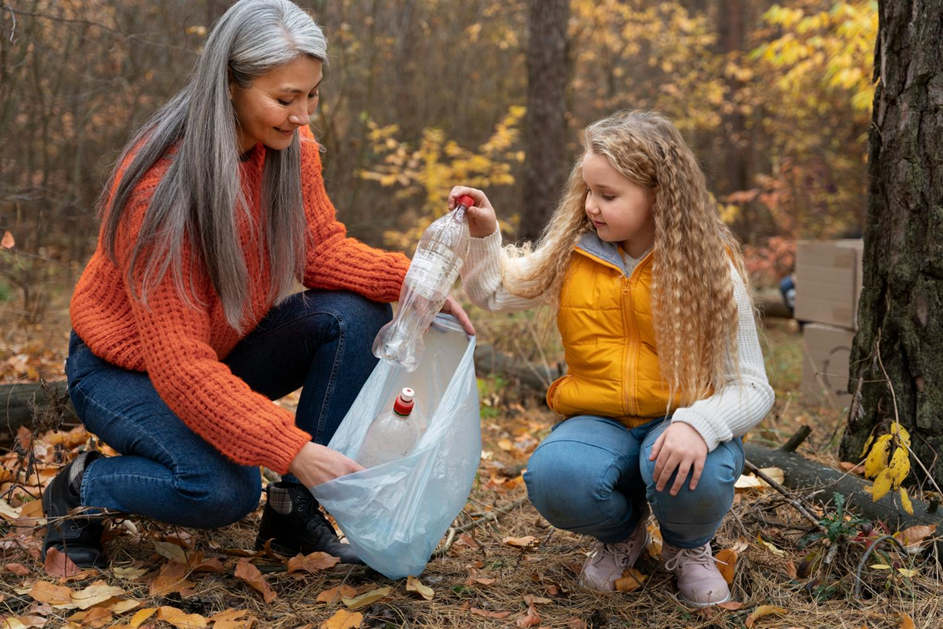We’ve prepared ways for you and your children to play at home. Together with helping kids to have a positive view on protecting their future environment, you’ll have fun studying with them. Mini skips hire is the most important element of this process, so make sure to hire a small skip for the children to use and learn.
Have Fun With It!
Youngsters enjoy making discoveries, exploring, and getting hands-on. If your kitchen cupboards are anything like ours, they’re brimming with utensils and containers that are just begging to be taken out and examined. Give children the freedom to take charge of their education by letting them organize the items in your cabinets.
Sort the elements into separate heaps according to their composition to make it into a game. Sporting goods into two heaps, plastic and other, would be a good place to start. It encourages young children to consider the advantages and disadvantages of certain materials, which is the first step towards creating environmentally responsible children!
Cut Down on the Plastic Used in School Lunches

Make your lunch and store it in a lunchbox to avoid bringing in prepackaged food. To save time, plan your meals throughout the entire week or make your sandwiches the evening before.
Replace your cling film with a reusable sandwich or beeswax wrap to further reduce your usage of plastic. To further prevent using plastic cutlery at work, think about packing a spoon, fork as well as Spork in your backpack or keeping cutlery on your desk
Cut Back on Waste During Bath Time
Kids frequently fill a bathtub full of plastic bottles with body wash, conditioner, shampoo, and bubble bath.
Replace the bottles with items with more environmentally friendly packaging including plant-based substances that won’t be bad for the natural world or your child.
Try using these suggestions below to replace some of the biggest producers of plastic garbage.
Tip 1: Use Soap Bars, Shampoo, and Conditioner
Bars of shampoo and conditioner typically come in recyclable paper packaging and lather just as much as ordinary shampoos. Nowadays, soap bars take up less space in the bath storage area and deliver just as much moisturizing as conventional body washes.
Kids can begin bathing themselves since bar soaps fit in little hands much more easily than large plastic bottles. It’s a win-win situation.
Tip 2: Refills and Concentrates
Concentrates as well as replacement packs are offered for body wash, bubble bath, shampoo, conditioner, and foaming hand soap. These less-waste options are more affordable and need less packaging. To help youngsters identify which goods are theirs, ask them to assist in finding attractive receptacles to place their refills in.
Tip 3: Natural and Eco-friendly Bath Toys
Using natural bath toys, bathtub bombs, bath coloured pencils, and other products can ensure that your children are safe to play with, have less plastic in them, and probably come in environmentally friendly packaging. When the youngsters are done playing, get them involved in recycling or composting the packaging!
Ensure You Have Compost Bins Or Easy Accessible Recycling
Now that everyone in your home is aware of the things that can be recycled, ensure that youngsters have simple access to your compost, recycling, and soft plastic containers. Even though they may know where something belongs, youngsters frequently end up placing things in the container that is simplest or closest to them. Given that it’s in a kitchen closet or under the food preparation area sink, this is most likely the trash can. To encourage kids to use the waste disposal bins, make them equally accessible.
The Diary In Plastic
How to assist kids in seeing how much plastic we use daily? Look for information and pictures on the internet that illustrate the consequences of plastic and the distinctions between reusable and single-use plastic. Make a seven-day calendar using several plastic categories. Ask your youngster to record every time they use plastic over the week. They will be able to observe exactly how much plastic has already been used and potential reductions after the week.
Final Words
Plastic trash is a major issue in the modern world. However, it’s a problem which can be lessened with little adjustments. Playing with your children to make them plastic-independent represents one of the biggest adjustments that you may make!
